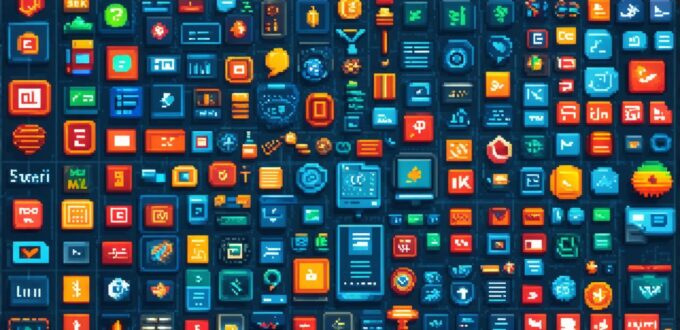As a software developer, you are constantly on the lookout for new and innovative ways to create applications that will captivate and engage your audience. With so many different types of application software available, it can be difficult to know where to start. In this comprehensive guide, we will explore 20 different kinds of application software, from basic productivity tools to complex enterprise applications.
1. Productivity Software: These are the most common types of software that every business needs. Examples include word processors, spreadsheets, and presentation software. These tools help you create documents, manage data, and communicate effectively with your team and clients.
2. Collaboration Software: With more people working remotely than ever before, collaboration software has become an essential tool for teams to stay connected and work together seamlessly. Examples include video conferencing software, project management tools, and chat applications.
3. Customer Relationship Management (CRM) Software: This type of software is designed to help businesses manage customer interactions and data across different channels. It helps you keep track of leads, contacts, and deals, making it easier to identify potential customers and close deals.

4. Enterprise Resource Planning (ERP) Software: ERP software integrates all aspects of a business’s operations into a single system. This includes finance, human resources, supply chain management, and more. It helps businesses streamline their processes and improve efficiency.
5. Project Management Software: This type of software is designed to help teams plan, organize, and execute projects on time and within budget. Examples include Gantt charts, task lists, and progress tracking tools.
6. Content Management System (CMS) Software: CMS software allows you to create and manage website content without needing to know how to code. This includes blog posts, images, and other types of content. It helps businesses keep their websites up-to-date and engaging.
7. Customer Service Software: This type of software is designed to help businesses provide excellent customer service by managing customer interactions and data across different channels. Examples include ticketing systems, chatbots, and knowledge bases.
8. Marketing Automation Software: Marketing automation software helps businesses automate repetitive marketing tasks such as email campaigns, social media posts, and lead generation. It helps you save time and resources while increasing the effectiveness of your marketing efforts.
9. Human Resources Management (HRM) Software: This type of software is designed to help businesses manage their employees’ data and tasks, including payroll, benefits, and training records. It helps you streamline HR processes and improve employee engagement.
10. E-Commerce Software: This type of software enables businesses to sell products and services online through an e-commerce website or marketplace. Examples include Shopify, WooCommerce, and Magento.
11. Cloud Computing Software: Cloud computing software allows you to access and store data, applications, and services over the internet. This includes storage services like Dropbox and Google Drive, collaboration tools like Slack, and productivity apps like Trello.
12. Mobile Application Software: Mobile application software is designed for use on mobile devices such as smartphones and tablets. Examples include social media apps like Instagram and Facebook, messaging apps like WhatsApp and Telegram, and gaming apps like Angry Birds and Candy Crush.
13. Internet of Things (IoT) Software: IoT software is designed to connect physical devices such as sensors, cameras, and thermostats to the internet. It enables businesses to collect and analyze data from these devices, improving efficiency and productivity.
14. Artificial Intelligence (AI) Software: AI software uses machine learning algorithms to automate tasks that are typically performed by humans. Examples include chatbots, voice assistants, and image recognition software.
15. Virtual Reality (VR) Software: VR software creates immersive experiences for users, allowing them to interact with virtual environments in a way that feels real. It is commonly used in gaming, education, and training industries.
16. Augmented Reality (AR) Software: AR software overlays digital information onto the real world, enhancing user experience by providing additional context and information. Examples include Snapchat filters and Pokémon Go.
17. Blockchain Software: Blockchain software is a distributed ledger technology that enables secure and transparent transactions without the need for intermediaries. It is commonly used in cryptocurrencies like Bitcoin, but also has applications in other industries such as supply chain management and voting systems.
18. Cybersecurity Software: Cybersecurity software is designed to protect businesses and individuals from cyber threats such as hacking, phishing, and malware. Examples include antivirus software, firewalls, and intrusion detection systems.
19. Gamification Software: Gamification software uses game design elements such as rewards, challenges, and leaderboards to engage users and motivate them to complete tasks or achieve goals. It is commonly used in education, fitness, and customer loyalty programs.
20.
